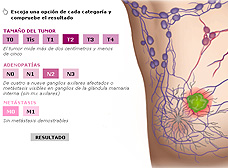
Breast Cancer. 2009 May 1
Possible treatment strategies for triple-negative breast cancer on the basis of molecular characteristics.
Kurebayashi J.
Department of Breast and Thyroid Surgery, Kawasaki Medical School, 577 Matsushima, Kurashiki, Okayama, 701-0192, Japan, kure@med.kawasaki-m.ac.jp.
The intrinsic subtype has demonstrated that breast cancers can be classified into biologically and clinically meaningful subgroups. Most breast tumors categorized as one of the intrinsic subtypes, i.e., basal-like, have an estrogen receptor-negative, progesterone receptor-negative, and human epidermal growth factor receptor 2-negative phenotype, so-called triple-negative (TN) phenotype; however, TN breast cancer is not a synonym for basal-like subtype. TN breast cancers account for 10-20% of all breast cancers, and are more biologically aggressive than breast cancers of other subgroups. Tailored therapies, such as endocrine therapy and anti-HER2 therapy, are not applicable to TN breast cancer. To develop novel strategies against TN breast cancer, it is essential to understand the specific pathways driving the aggressive behavior of TN breast cancer. Preclinical and clinical studies have suggested that DNA-damaging agents and poly ADP-ribose polymerase inhibitors are active in TN breast cancer harboring BRCA1 dysfunction; anti-epidermal growth factor receptor (EGFR) antibodies and EGFR tyrosine kinase inhibitors are active in TN breast cancer with EGFR gene amplification; dasatinib is active in TN breast cancer with activated Src tyrosine kinases; inhibitors of a mammalian target of rapamycin are active in TN breast cancer with loss of PTEN tumor suppressor; antiangiogenic therapies enhance antitumor activity of chemotherapeutic agents in hypervascular TN breast cancer; and irinotecan, trabectedin, ixabepilone, and ABI-007 are active in TN breast cancer. A number of clinical trials are ongoing to clarify the antitumor activity of these challenging treatment strategies. Further biological characterization of TN breast cancer is needed to develop more specific treatment strategies against TN breast cancer.